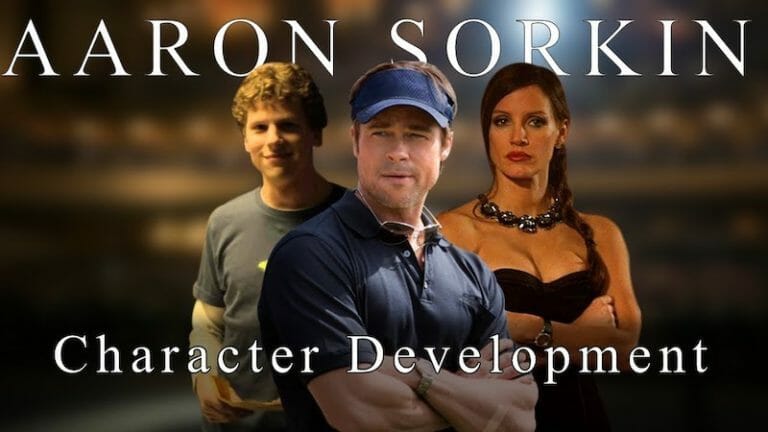By Ken Miyamoto · April 8, 2019

How do great screenwriters like Aaron Sorkin develop their characters?
Welcome to our ongoing Learning from the Masters and Industry Insiders series where we seek out and feature excellent videos, interviews, and discussions of the art, craft, and business of screenwriting and pull the best words of wisdom, writing tips, and screenwriting advice.
Here we feature Jack’s Movie Reviews‘s Aaron Sorkin — How to Develop Characters video and share some of the best information that you can use to help develop your characters.
When you develop your characters, you have to establish their intentions and the obstacles they face to attain those things.
Sorkin says, “It all boils down to intention and obstacles. Somebody wants something. Something standing in their way of getting it.”
He goes on to break down that it’s better if they need it, as opposed to just wanting it. The tactics that your characters use to attain that something will define the type of character they are.
In Sorkin’s script for The Social Network, it was clear that Zuckerberg wanted to create something that he could call his own and take all of the credit for it while enjoying all of the glory. And his tactics to accomplishing that included arguably stealing the idea from two peers (the Winklevoss twins) and squeezing his co-founder, Eduardo Saverin, out of the business. That defines his character.
The Winklevoss twins want their fair share of the credit and profits because they believe the concept of Facebook originated with their idea. So they decide to sue Zuckerberg. They take the legal route thanks to their legal father’s roots and the honor system of their college. That defines their characters.
Eduardo wants his share as well but doesn’t go to the lengths that Zuckerberg does to attain success. He wants to do what is right, no matter what it costs the product of Facebook. That defines his character.
Figure out what your characters want or need (sometimes those are the same) — their intentions — and put obstacles in their way. That will define your characters.
The video points out that Sorkin’s most recent films in the last decade often open with the protagonist experiencing some sort of failure.
“The characters that I write are going to be kind of quixotic. They’re going to fail a lot. And fall a lot. But there’s a romance in trying for honorable things.”
In Molly’s Game, her Olympic run comes to a halt.

Download the script for MOLLY’S GAME here for free
In Steve Jobs, the Apple presentation had major technical difficulties.

Download the script for STEVE JOBS here for free
In Moneyball, Billy Beane’s A’s lose to the Yankees.

Download the script for MONEYBALL here for free
In The Social Network, Zuckerberg is rejected by Erica.

Download the script for THE SOCIAL NETWORK here for free
Sorkin is opening these stories on the protagonist’s worst day. This creates sympathy for these characters, allowing the audience to feel some empathy towards them. This especially helps viewers connect with otherwise deplorable people. Zuckerberg, and how his character is defined, is difficult to like. But because we see him being dumped by a girl, we feel sympathy for him and somehow relate to him. Maybe he’s due for something good to happen?
Failure also creates a sense of ambition. They have nothing to lose so they do all that they can to achieve their goals — for better or worse. This helps the plot of the story as well because ambition leads to conflict. His characters try to accomplish what they want the usual way, but that often doesn’t work. So they have to be creative.
Zuckerberg steals an idea and makes it popular in unconventional ways.
Billy Beane can’t outspend the Yankees, so he has to build the perfect team in unconventional ways.
And these unconventional routes that are taken create the necessary conflict that all great screenplays need.
When characters finally succeed, in whatever way, shape, or form, there’s always a cost. Perhaps it’s the cost of friends, lives, or close relationships. Perhaps what the character thought they wanted ended up being their downfall. And any redemption that follows is a direct result of the elements that defined their character along the way amidst all of the obstacles they had to get through to get where they are by the end.
Sometimes redemption is small and personal. And there’s nothing wrong with that. Sometimes there is no redemption, but a lesson taught to the audience.
Success at a cost and any redemption that is experienced by your characters in the end, big or small, is the final arc of the character that you’ve developed.
Watch the whole video for more elaboration and examples from Aaron Sorkin’s work. Hopefully these methods help you create some outstanding characters.
For all the latest from The Script Lab, be sure to follow us on Twitter, Facebook, and Instagram.
And become a member of TSL 360 to enjoy the LARGEST screenwriting education content library, featuring masterclasses, deep-dive interviews, and lectures from Academy Award-winning screenwriters, TV show-runners, producers, literary managers, agents, studio executives, and leading educators – all in one place.